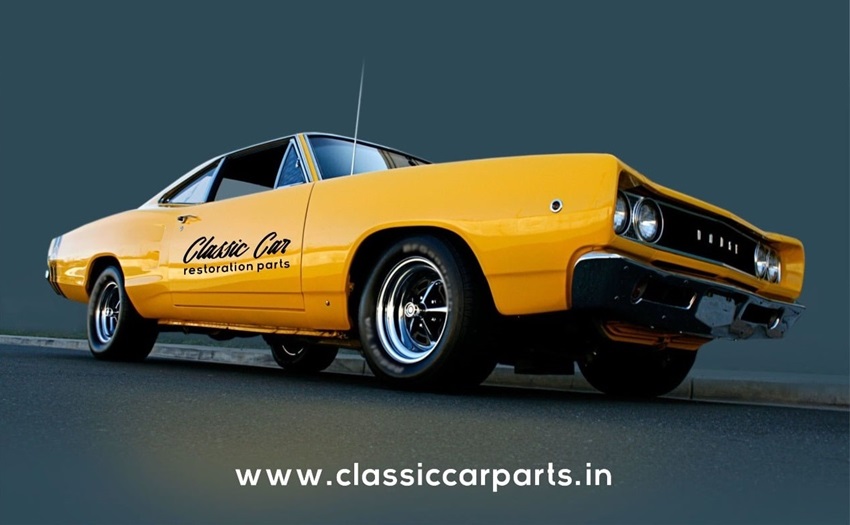Classic cars have always fascinated enthusiasts and collectors alike. The allure of vintage design, engineering marvels, and a touch of nostalgia make classic cars a coveted possession. However, one aspect that often baffles many is the consistently high prices of classic automobiles. Despite fluctuations in the economy and automotive industry trends, classic car prices seem to defy gravity.
In this blog, we will find out the reasons behind the high prices of classic cars, and explore the factors contributing to their enduring value.
Rarity and Historical Significance
Classic car prices are high due to their rarity and historical significance. Unlike contemporary vehicles which often share similar designs, antique automobiles represent a unique piece of bygone eras. Over time, these vintage vehicles become even scarcer, driving up their market value.
Unlike mass-produced modern cars, classic automobiles are crafted with meticulous care and attention, resulting in a longer production process and consequently higher costs.
Moreover, classic cars hold a special place in history, having played a pivotal role in the evolution of automotive technology and often being associated with notable figures. For instance, a vintage car once owned by a famous movie star or politician may fetch a premium due to its prestigious past. Collectors are willing to invest significant sums to acquire such pieces of automotive history.
Brand Influence
Let’s begin with understanding what a brand is. Brands serve as reputation markers for products, akin to our designer clothes or luxury gadgets. Classic cars proudly bear the insignias of renowned automobile manufacturers such as Ferrari, Porsche, or Rolls-Royce.
What sets these brands apart is their rich history, unwavering quality, timeless style, and impeccable performance. As a result, many individuals aspire to own them not just as modes of transportation but as symbols of status. This heightened demand naturally leads to an increase in prices.
Also Read: Top 5 Best Classic or Vintage Restoration Parts Manufacturers
Collectors and enthusiasts are willing to pay a premium for the prestige associated with owning a revered brand from the past. The combination of rarity and iconic status further elevates prices, making cars from esteemed brands like Bugatti, Aston Martin, and Lamborghini among the most coveted and expensive classic cars.
Age Factor
While it may seem counterintuitive, unlike new cars which typically lose value over time, many classic or vintage or antique cars appreciate in worth as they age. This can lead to older models being valued higher than their initial purchase price, as individuals often prefer updated versions to the original ones.
Ultimately, classic cars appreciate in value due to their rarity, emotional significance, and historical importance. Unlike modern cars that depreciate over time, these vintage treasures only become more valuable with age.
Restorations and Maintenance
These are ancient cars, so in addition to the cost of repair, there is also the expense of returning them to their original condition. It can be more difficult to restore older antique cars than it is to restore a newer car model.
Finding classic car spare parts is difficult and expensive, often leading owners to seek alternative parts or even fabricate them independently. Moreover, maintaining these vehicles is a time-consuming and knowledge-intensive endeavor, which adds to the overall expense.
Market Demand
The growing demand for classic cars is causing their prices to rise. This is a common economic trend where once-abundant items become scarce, leading to an increase in their value.
Certain classics, such as vintage Bugatti, Lamborghini, Ferrari, and Porsche models, are particularly enjoyed by exotic car collectors, further driving up their prices.
Investment Potential
Classic vehicles are investments rather than just purchases. Classic cars are increasingly viewed as alternative investments, offering potential financial returns. With stocks and real estate subject to market volatility, many investors turn to tangible assets like classic cars to diversify their portfolios and hedge against inflation. This investment ensures that classic cars become more valuable with each passing moment.
Conclusion
The enduring allure of classic cars lies in their timeless appeal, historical significance, and investment potential. Factors such as rarity, craftsmanship, emotional attachment, and market dynamics contribute to the perpetually high prices of classic automobiles. As long as enthusiasts continue to cherish these automotive treasures, the market for classic cars will remain resilient, defying economic fluctuations and sustaining its allure for generations to come.
Frequently Asked Questions (FAQs)
1. Are classic cars a good investment?
Classic cars can be a good investment if purchased wisely and maintained properly. However, it’s essential to research the market thoroughly and seek expert advice before investing in classic automobiles.
2. How do I determine the value of a classic car?
The value of a classic car depends on various factors such as its condition, rarity, provenance, and market demand. Consulting appraisal guides, and vintage car experts, and attending auctions can help gauge a classic car’s value accurately.
3. What maintenance is required for classic cars?
Classic cars require regular maintenance to preserve their condition and value. This includes routine inspections, servicing, and periodic restoration work to address wear and tear. Proper storage and climate control are also crucial for safeguarding classic cars from deterioration.
4. Are classic cars practical for daily use?
While some classic cars are suitable for occasional driving, they may not be practical for daily use due to factors such as fuel efficiency, safety features, and availability of spare parts. Most classic car owners prefer to preserve their vehicles for special occasions or leisurely drives.
5. How do I start collecting classic cars?
Starting a classic car collection requires careful planning, research, and financial resources. Begin by identifying your interests, setting a budget, and researching different makes and models. Joining enthusiast clubs, attending car shows, and networking with fellow collectors can also provide valuable insights and opportunities for acquiring classic cars.

